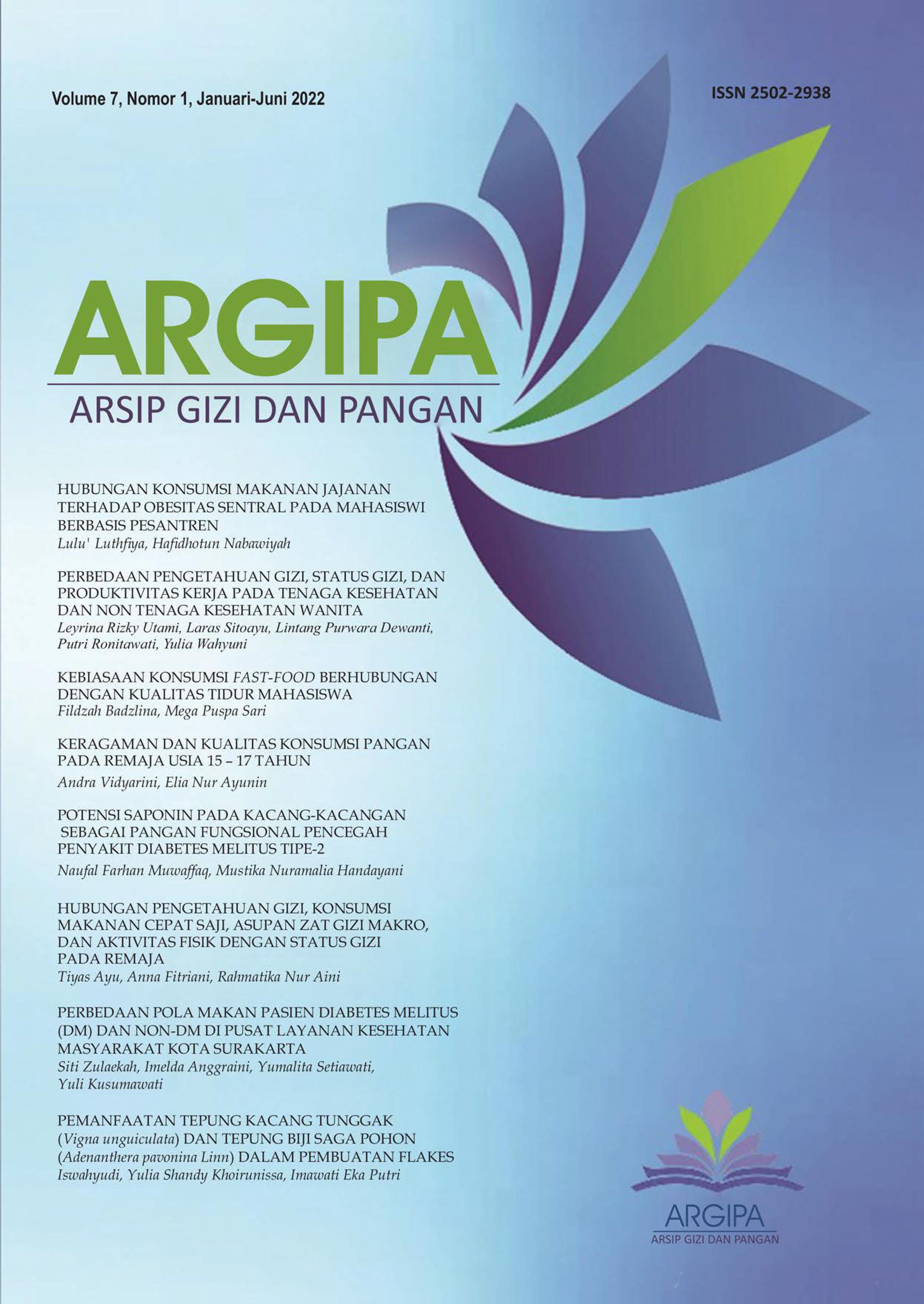Association between sleep quality and eating pattern of college students
DOI:
https://doi.org/10.22236/argipa.v7i1.7944Keywords:
college students, fast-food consumption, sleep qualityAbstract
College students are prone to have poor sleep quality. This can cause eating disorders in students which can increase the incidence of obesity. The purpose of this study was to determine the relationship between student sleep quality and eating habits as a preventative measure to increase the incidence of obesity. This study was an observational quantitative study with a cross-sectional approach. The subjects of this study were 107 students of the University of Muhammadiyah Prof. DR. Hamka (UHAMKA) with purposive sampling technique. Sleep quality data was taken using the Pittsburgh Sleep Quality Index (PSQI) questionnaire using the google form which was distributed to all students of the UHAMKA in September 2021. The data analysis carried out was the Man Whitney Test because the data were not normally distributed. The results showed that there was a significant relationship between sleep quality and fast food consumption habits. However, there is no relationship between sleep quality and fruit consumption, vegetable consumption, and consumption of sweetened foods and beverages. This study extends previous research regarding the relationship between poor sleep quality and the frequency of fast food consumption in college students.Downloads
Download data is not yet available.
References
Ali, W., Onibala, F., & Bataha, Y. (2017). Perbedaan anak usia remaja yang obesitas dan tidak obesitas terhadap kualitas tidur di SMP Negeri 8 Manado. Jurnal Keperawatan, 5(1).
Boozari, B., Saneei, P., & Safavi, S. M. (2021). Association between sleep duration and sleep quality with sugar and sugar-sweetened beverages intake among university students. Sleep and Breathing, 25(2), 649-656.
Cakir, B., Kılınç, F. N., Uyar, G. í–., í–zenir, í‡., Ekici, E. M., & KaraismailoÄŸlu, E. (2020). The relationship between sleep duration, sleep quality and dietary intake in adults. Sleep and Biological Rhythms, 18(1), 49-57.
Crivello, A., Barsocchi, P., Girolami, M., & Palumbo, F. (2019). The meaning of sleep quality: a survey of available technologies. IEEE Access, 7, 167374-167390
Ibrahim, N. K., Badawi, F., Mansouri, Y., Ainousa, A., & Jambi, S. (2017). Sleep quality among medical students at King Abdulaziz University: a cross-sectional study. J Community Med Health Educ, 7(561), 2161-711.
Jansen, E. C., She, R., Rukstalis, M., & Alexander, G. L. (2021). Changes in fruit and vegetable consumption in relation to changes in sleep characteristics over a 3-month period among young adults. Sleep Health, 7(3), 345-352.
Katagiri, R., Asakura, K., Kobayashi, S., Suga, H., & Sasaki, S. (2014). Low intake of vegetables, high intake of confectionary, and unhealthy eating habits are associated with poor sleep quality among middle-aged female Japanese workers. Journal of occupational health, 14-0051.
Kementerian Kesehatan RI. (2018). Laporan Nasional Riskesdas. Badan Penelitian dan Pengembangan Kesehatan.
Matsunaga, T., Nishikawa, K., Adachi, T., & Yasuda, K. (2021). Associations between dietary consumption and sleep quality in young Japanese males. Sleep and Breathing, 25(1), 199-206.
Min, C., Kim, H. J., Park, I. S., Park, B., Kim, J. H., Sim, S., & Choi, H. G. (2018). The association between sleep duration, sleep quality, and food consumption in adolescents: A cross-sectional study using the Korea Youth Risk Behavior Web-based Survey. BMJ open, 8(7), e022848.
Nilifda, H., Nadjmir, N., & Hardisman, H. (2016). Hubungan kualitas tidur dengan prestasi akademik mahasiswa program studi pendidikan dokter angkatan 2010 FK Universitas Andalas. Jurnal kesehatan andalas, 5(1).
Noorwali, E. A., Cade, J. E., Burley, V. J., & Hardie, L. J. (2018). The relationship between sleep duration and fruit/vegetable intakes in UK adults: a cross-sectional study from the National Diet and Nutrition Survey. BMJ open, 8(4), e020810.
Noorwali, E., Hardie, L., & Cade, J. (2019). Bridging the reciprocal gap between sleep and fruit and vegetable consumption: a review of the evidence, potential mechanisms, implications, and directions for future work. Nutrients, 11(6), 1382.
Okano, K., Kaczmarzyk, J. R., Dave, N., Gabrieli, J. D., & Grossman, J. C. (2019). Sleep quality, duration, and consistency are associated with better academic performance in college students. NPJ science of learning, 4(1), 1-5.
Pengpid, S., & Peltzer, K. (2020). Fruit and Vegetable Consumption is Protective from Short Sleep and Poor Sleep Quality Among University Students from 28 Countries. Nature and Science of Sleep, 12, 627.
Rasch, B., & Born, J. (2013). About sleep's role in memory. Physiological Reviews, 93(2), 681–766.
Sampasa-Kanyinga, H., Hamilton, H. A., & Chaput, J. P. (2018). Sleep duration and consumption of sugar-sweetened beverages and energy drinks among adolescents. Nutrition, 48, 77-81.
Sarfriyanda, J., Karim, D., Dewi, A. P. (2015). Hubungan antara kualitas tidur dan kuantitas tidur dengan prestasi belajar mahasiswa (Doctoral dissertation, Riau University).
Schmidt, M. H. (2014). The energy allocation function of sleep: a unifying theory of sleep, torpor, and continuous wakefulness. Neuroscience & Biobehavioral Reviews, 47, 122-153.
Setyowati, A., & Chung, M. H. (2020). Validity and reliability of the Indonesian version of the Pittsburgh Sleep Quality Index in adolescents. International Journal of Nursing Practice, e12856.
Spiegel, K., Tasali, E., Penev, P., & Cauter, E. V. (2004). Brief communication: sleep curtailment in healthy young men is associated with decreased leptin levels, elevated ghrelin levels, and increased hunger and appetite. Annals of internal medicine, 141(11), 846-850.
Sulistiyani, C. (2012). Beberapa faktor yang berhubungan dengan kualitas tidur pada mahasiswa Fakultas Kesehatan Masyarakat Universitas Diponegoro Semarang. Jurnal Kesehatan Masyarakat Universitas Diponegoro, 1(2), 18762.
Valerio, T. D., Kim, M. J., & Sexton-Radek, K. (2016). Association of stress, general health, and alcohol use with poor sleep quality among US college students. American Journal of Health Education, 47(1), 17-23.
Wang, L., Qin, P., Zhao, Y., Duan, S., Zhang, Q., Liu, Y., ... & Sun, J. (2016). Prevalence and risk factors of poor sleep quality among Inner Mongolia Medical University students: A cross-sectional survey. Psychiatry Research, 244, 243-248.
Young, D. R., Sidell, M. A., Grandner, M. A., Koebnick, C., & Troxel, W. (2020). Dietary behaviors and poor sleep quality among young adult women: watch that sugary caffeine!. Sleep health, 6(2), 214-219.
Yusnira, Y., & Lestari, M. (2021). Hubungan Asupan Energi, Kualitas Tidur, Dan Aktifitas Fisik Dengan Kejadian Overweight di SMKN 1 Bangkinang. Jurnal Pendidikan Tambusai, 5(3), 5723-5736.
Boozari, B., Saneei, P., & Safavi, S. M. (2021). Association between sleep duration and sleep quality with sugar and sugar-sweetened beverages intake among university students. Sleep and Breathing, 25(2), 649-656.
Cakir, B., Kılınç, F. N., Uyar, G. í–., í–zenir, í‡., Ekici, E. M., & KaraismailoÄŸlu, E. (2020). The relationship between sleep duration, sleep quality and dietary intake in adults. Sleep and Biological Rhythms, 18(1), 49-57.
Crivello, A., Barsocchi, P., Girolami, M., & Palumbo, F. (2019). The meaning of sleep quality: a survey of available technologies. IEEE Access, 7, 167374-167390
Ibrahim, N. K., Badawi, F., Mansouri, Y., Ainousa, A., & Jambi, S. (2017). Sleep quality among medical students at King Abdulaziz University: a cross-sectional study. J Community Med Health Educ, 7(561), 2161-711.
Jansen, E. C., She, R., Rukstalis, M., & Alexander, G. L. (2021). Changes in fruit and vegetable consumption in relation to changes in sleep characteristics over a 3-month period among young adults. Sleep Health, 7(3), 345-352.
Katagiri, R., Asakura, K., Kobayashi, S., Suga, H., & Sasaki, S. (2014). Low intake of vegetables, high intake of confectionary, and unhealthy eating habits are associated with poor sleep quality among middle-aged female Japanese workers. Journal of occupational health, 14-0051.
Kementerian Kesehatan RI. (2018). Laporan Nasional Riskesdas. Badan Penelitian dan Pengembangan Kesehatan.
Matsunaga, T., Nishikawa, K., Adachi, T., & Yasuda, K. (2021). Associations between dietary consumption and sleep quality in young Japanese males. Sleep and Breathing, 25(1), 199-206.
Min, C., Kim, H. J., Park, I. S., Park, B., Kim, J. H., Sim, S., & Choi, H. G. (2018). The association between sleep duration, sleep quality, and food consumption in adolescents: A cross-sectional study using the Korea Youth Risk Behavior Web-based Survey. BMJ open, 8(7), e022848.
Nilifda, H., Nadjmir, N., & Hardisman, H. (2016). Hubungan kualitas tidur dengan prestasi akademik mahasiswa program studi pendidikan dokter angkatan 2010 FK Universitas Andalas. Jurnal kesehatan andalas, 5(1).
Noorwali, E. A., Cade, J. E., Burley, V. J., & Hardie, L. J. (2018). The relationship between sleep duration and fruit/vegetable intakes in UK adults: a cross-sectional study from the National Diet and Nutrition Survey. BMJ open, 8(4), e020810.
Noorwali, E., Hardie, L., & Cade, J. (2019). Bridging the reciprocal gap between sleep and fruit and vegetable consumption: a review of the evidence, potential mechanisms, implications, and directions for future work. Nutrients, 11(6), 1382.
Okano, K., Kaczmarzyk, J. R., Dave, N., Gabrieli, J. D., & Grossman, J. C. (2019). Sleep quality, duration, and consistency are associated with better academic performance in college students. NPJ science of learning, 4(1), 1-5.
Pengpid, S., & Peltzer, K. (2020). Fruit and Vegetable Consumption is Protective from Short Sleep and Poor Sleep Quality Among University Students from 28 Countries. Nature and Science of Sleep, 12, 627.
Rasch, B., & Born, J. (2013). About sleep's role in memory. Physiological Reviews, 93(2), 681–766.
Sampasa-Kanyinga, H., Hamilton, H. A., & Chaput, J. P. (2018). Sleep duration and consumption of sugar-sweetened beverages and energy drinks among adolescents. Nutrition, 48, 77-81.
Sarfriyanda, J., Karim, D., Dewi, A. P. (2015). Hubungan antara kualitas tidur dan kuantitas tidur dengan prestasi belajar mahasiswa (Doctoral dissertation, Riau University).
Schmidt, M. H. (2014). The energy allocation function of sleep: a unifying theory of sleep, torpor, and continuous wakefulness. Neuroscience & Biobehavioral Reviews, 47, 122-153.
Setyowati, A., & Chung, M. H. (2020). Validity and reliability of the Indonesian version of the Pittsburgh Sleep Quality Index in adolescents. International Journal of Nursing Practice, e12856.
Spiegel, K., Tasali, E., Penev, P., & Cauter, E. V. (2004). Brief communication: sleep curtailment in healthy young men is associated with decreased leptin levels, elevated ghrelin levels, and increased hunger and appetite. Annals of internal medicine, 141(11), 846-850.
Sulistiyani, C. (2012). Beberapa faktor yang berhubungan dengan kualitas tidur pada mahasiswa Fakultas Kesehatan Masyarakat Universitas Diponegoro Semarang. Jurnal Kesehatan Masyarakat Universitas Diponegoro, 1(2), 18762.
Valerio, T. D., Kim, M. J., & Sexton-Radek, K. (2016). Association of stress, general health, and alcohol use with poor sleep quality among US college students. American Journal of Health Education, 47(1), 17-23.
Wang, L., Qin, P., Zhao, Y., Duan, S., Zhang, Q., Liu, Y., ... & Sun, J. (2016). Prevalence and risk factors of poor sleep quality among Inner Mongolia Medical University students: A cross-sectional survey. Psychiatry Research, 244, 243-248.
Young, D. R., Sidell, M. A., Grandner, M. A., Koebnick, C., & Troxel, W. (2020). Dietary behaviors and poor sleep quality among young adult women: watch that sugary caffeine!. Sleep health, 6(2), 214-219.
Yusnira, Y., & Lestari, M. (2021). Hubungan Asupan Energi, Kualitas Tidur, Dan Aktifitas Fisik Dengan Kejadian Overweight di SMKN 1 Bangkinang. Jurnal Pendidikan Tambusai, 5(3), 5723-5736.
Downloads
Published
2022-06-21
How to Cite
Badzlina, F., & Sari, M. P. (2022). Association between sleep quality and eating pattern of college students . ARGIPA (Arsip Gizi Dan Pangan), 7(1), 21–30. https://doi.org/10.22236/argipa.v7i1.7944
Issue
Section
Articles

















